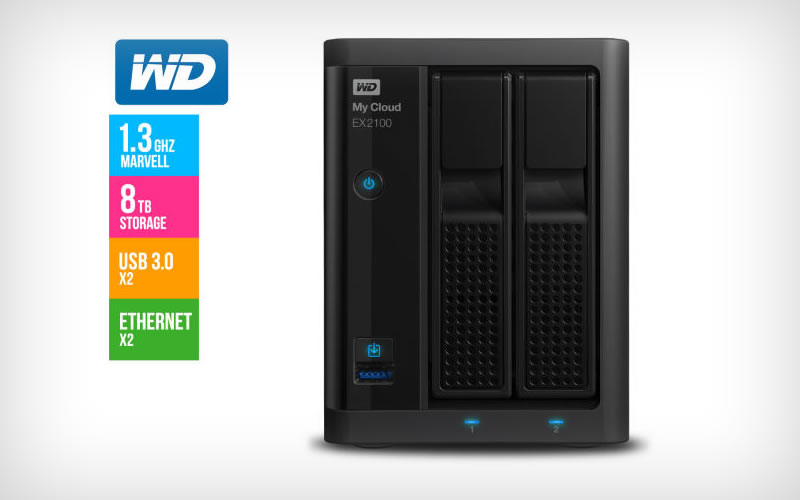Disk storage huge WD has actually increased its mid-range line of NAS bins, including some required efficiency to your range with all the new EX2100 and EX4100 designs, supplying two and four disk bays specifically. The underpowered My Cloud EX2 and EX4, the first two- and fourbay versions, remain but with these brand new enhancements to your Expert Series WD is encouraging decent file write performance – the Achilles’ heel of all of the spending plan NAS boxes. The EX2100 is based on the My Cloud software application platform, utilizing a now-mature modification of a Linux-based os that is splashing with useful functions. WD has actually adapted the versatile BusyBox Linux package, including a unique visual user interface, and feeding right back its modifications by launching the customized source code as required by the GPLv2 permit. The variation used with WD’s current 1.06.127 firmware is dependant on Linux bit 3.10.39, with BusyBox 1.20.2 from July 2012. The hardware to accommodate the disks and cpu is much more up to date and wholly brand new – a compact and nicely packed black colored field with steel wraparound address and carefully molded front plastic fascia. The disks can be obtainable through the front side, issued by bars but with no additional securing to prevent prying hands from standing out a disk. Rather than mount the disks in added caddies or trays, the raw disk slides in to the bay, with a solid springtime to help keep it held firm after the door has been clicked shut. At the rear of the system is an individual 65mm cooling fan, very nearly soundless in typical consumption, and combined with the silent operation of this WD Red hard drives inside we now have a usefully low-noise storage solution. Powering the EX2100 and helping keep heat and sound down is a low-power ARM processor. The Marvell Armada 385 is a brand new system-on-a-chip with dual-core 1.3GHz processor, supported with 1GB of memory.
Two USB ports are available, both to USB 3.0 specification, one on the front side and one in the back. You will find two gigabit system ports too, designed for consumption together for website link aggregation to improve throughput or even for fail over safety and security. Power originates from an external laptop-style 48W mains adaptor, which connects to an individual DC inlet on the backside. Overall develop high quality is great, with high requirements of fit and coating, making a sturdy system without creaks or rattles. The My Cloud firmware is a thorough os and interface. From the primary web page, you’ve got a useful summary of the fundamental working parameters – starting with readily available capacity in huge figures, an image of this hardware outside and tick bins to demonstrate system health insurance and firmware variation. Across the top line is a running strip of symbols for digging deeper, such as User, Shares, Backups, Storage and Settings. Likewise readily available is an Apps tab, where you could download and set up extra applications to grow the unit’s capabilities. Below we discovered providings from WordPress, Dropbox and Acronis, as well as two more BitTorrent customers (aMule and Transmission) readily available as alternatives to WD’s own built-in BT software. Under the Storage tab, you can configure the disk plan; with only two disks in the EX2100 you’ll establish these to RAID 1; RAID 0 for largest single-volume capability and best prospective speed; and JBOD for separate addressable quantities. There’s also an alternative for Spanning, which incorporates the two disks in a linear manner to swell capacity without striping. The My Cloud EX2100 became exponentially faster than its cheaper My Cloud predecessors in consecutive data review and write speeds. Where in actuality the EX4 battled to reach 100MB/s read speeds, and limped along with lists at about 37MB/s, the EX2100 arrived nearer to filling up a single gigabit ethernet link – that is, transfers as much as around 120MB/s.
We examined the version with two 4TB WD Red disks in its default RAID 1 plan; very first in Windows over SMB utilizing CrystalDiskMark storage standard. Right here we saw consecutive transfer outcomes of 103MB/s for reads and 109MB/s for writes. Smaller 512kB data zipped also, at 100- and 97MB/s correspondingly. Digging down to the more difficult 4kB data level nevertheless, the EX2100 struggled to steadfastly keep up its earlier pace – 4kB random reads and composes had been to 9.9MB/s and 4.2MB/s respectively. But these figures contrast well with Synology’s budget DS115j, for instance, which taped similar 4.4MB/s read speed for 4kB files but just 2.7MB/s write speed. Within the 32 queue-depth test for 4kB random data, compose rates had been unmodified but random reviews rose to 51.5MB/s. ATTO Disk Benchmark reported consecutive maxes of 118MB/s for both reviews and composes for all data above 128kB in dimensions. And 4kB sequential IO here was up to 26.8MB/s reads and 22.2MB/s composes. Energy consumption had been reduced, once we would really hope from an ARM driven NAS drive. Aided by the device worried with different data transfer tasks, we saw a maximum of 18 W power intake.
WD My Cloud EX2100 8TB Specifications:
- 8TB NAS drive
- 2-bay NAS enclosure
- My Cloud OS 1.06.127
- 2x WD Red 3.5in SATA HDD
- 1.3GHz Marvel Armada 385 dual-core ARM processor
- 1GB RAM
- 2x gigabit ethernet
- 2x USB 3.0
- 48W external power supply
- 216x109x148mm; 3.5kg
